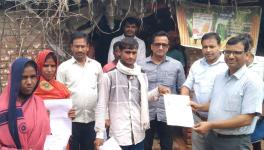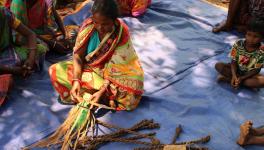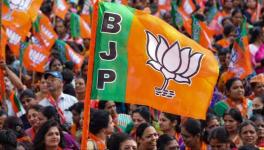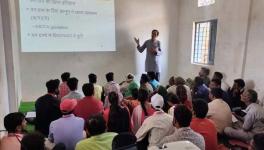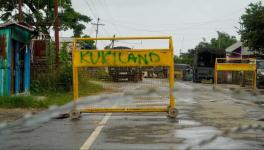TN: Irular Tribe Long for Community Certificates, Face Hampered Education and Constitutional Rights
The Irular tribe, a particularly vulnerable tribal group (PVTG), face multiple challenges in Tamil Nadu including access to education. With the COVID-19 pandemic wrecking havoc, the students have been forced out of schools, since their closure from March 2020. The 49% literacy rate among the community in the state is lower than the 58.6% national rate of scheduled tribes (ST).
The administrative delays in obtaining community certificates, at times for several years, dent the hopes of students aspiring for higher education. Without the community certificates, the students from the semi-nomadic tribe are left to compete in the general category, unable to claim the constitutional right of reservation, while securing scholarships become impossible.
Employment, housing and other basic amenities including electricity continue to elude the community, contributing to their woes for decades. A large percentage of the community has not enrolled as voters, making them a less attractive group for the mainstream political parties.
OFFICIAL APATHY DELAYS COMMUNITY CERTIFICATES
Official apathy is being alleged as the reason behind the inordinate delay in issuing community certificates. Though there are no legal hurdles, the community continues to be neglected by the government machinery.
Murugesan, Chengalpet district secretary of the Tamil Nadu Tribals Association (TNTA), pointed out gross negligence from the official machinery as the reason for the prevailing status of the tribe. “They are forced to wait for several months and even years for getting the community certificates. This results in the denial of the rights entitled for the community, including reservation in education and scholarships,” he told NewsClick.
The Irulas are the second most populous tribal community in Tamil Nadu and one among the six notified primitive tribal groups in the state.
“The government officials sit on the request for community certificates. This has resulted in hundreds of students losing their opportunity to pursue higher education. Only after the interference of tribal rights organisations, the process gets speeded up,” Murugesan added.
The general perception of considering the Irulas as hill-tribes also delays the process. “Over a period of time, the Irulas have relocated, by force at times to the plains. The officials decide against the request for the community certificates. The government has to ensure such things are addressed shortly,” he said.
EDUCATION AND ADMISSION IN ONLINE MODE: AN UPHILL TASK
The state government has announced that the application for admission to arts, science and engineering colleges will be carried out online, due to the COVID-19 pandemic.
“The people of the Irular tribe make their living from catching snakes, rats and are now involved in menial jobs. They have hardly any access to smartphones or internet. This dismisses the possibility of even applying for enrolment to higher education,” said Saravanan, state general secretary of the TNTA.
The community continues to struggle over the low enrolment rate in schools, which is as low as 40% in the adolescent age group. The lack of awareness of online education and online application for higher studies could push the community back further, according to the TNTA.
“Employment and education has remained a huge challenge for the community for long. Only these two elements can help the community in improving their social and economic status. The state government should ensure such vulnerable communities are ensured of their rights,” Saravanan further added.
BASIC AMENITIES ELUDE COMMUNITY
Another plight of the community is the lack of permanent houses and house pattas. The TNTA and the All India Kisan Sabha (AIKS) have led several struggles to ensure the tribal communities receive their land and house pattas.
They live in temporary tents with palm leaves or plastic sheets. The community members are being forced to live in the poramboke lands (land outside revenue records), without basic facilities of electricity, drinking water and toilets.
“The people of the community live alongside the rivers, ponds or lakes. They do not own land in most cases, making them easy targets. Such basic needs must be ensured for the improvement of the community,” demanded Saravanan.
The intervention of the TNTA and other tribal rights organisations have resulted in houses being built for the Irulars in Tiruvannamalai district.
“As of now 1,650 houses, each at a cost of Rs 3 lakh is under construction for the community. This came after a prolonged struggle and initiation from the district collector. Other northern districts of the state, where the Irular population is high, should emulate this model,” Saravanan added.
‘VOTING RIGHTS COULD INVITE ATTENTION’
Most of the Irulars still do not possess public distribution shop (PDS) cards, Aadhar and voter identity cards.
“TNTA was formed in 2005 and since then we have been fighting for the rights of all sections of the tribal population. After prolonged struggle, we are getting them the basic identity cards required. This is a prolonged struggle,” said Saravanan.
The political parties have shown little interest in the development of the community, since they are spread across several places and are not enrolled as voters.
“This makes them a low interest group for the political parties. If they start to exercise their rights, maybe the political parties will turn their attention towards them. But, TNTA will continue the fight to win their rights,” Saravanan added.
Get the latest reports & analysis with people's perspective on Protests, movements & deep analytical videos, discussions of the current affairs in your Telegram app. Subscribe to NewsClick's Telegram channel & get Real-Time updates on stories, as they get published on our website.










